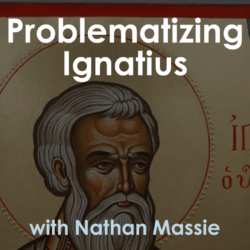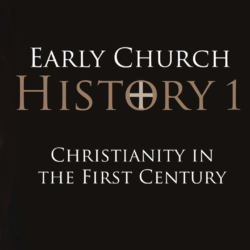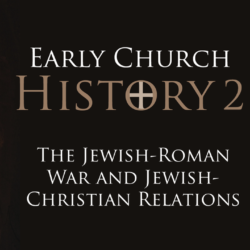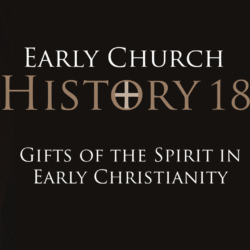This is part 9 of the Early Church History class.
How did Christians organize themselves in the first few centuries? We’re taking a break from theology and switching to focus on practical matters of church offices, church governance, church discipline, conversion, and charity. As it turns out we have a surprising amount of information about how early Christians did church not only from scattered quotes, but from a series of church manuals that have survived. In some ways these church orders sound eerily familiar to modern ears and in other ways, utterly foreign. See what you think.
Listen to this episode on Spotify or Apple Podcasts
—— Links ——
- More Restitutio resources on Christian history
- See other classes here
- Support Restitutio by donating here
- Join our Restitutio Facebook Group and follow Sean Finnegan on Twitter @RestitutioSF
- Leave a voice message via SpeakPipe with questions or comments and we may play them out on the air
- Intro music: Good Vibes by MBB Attribution-ShareAlike 3.0 Unported (CC BY-SA 3.0) Free Download / Stream: Music promoted by Audio Library.
- Who is Sean Finnegan? Read his bio here
—— Notes ——
Sources
- The Didache (100)[1]
- Apostolic Tradition (215) (Hippolytus?)[2]
- Didascalia Apostolorum (230)[3]
- Apostolic Church Order (300)[4]
- Apostolic Constitutions (380)[5]
- quotes from others like Justin, Tertullian, Hippolytus, Cyprian, etc.
Church Orders are notoriously hard to date (composite documents). They don’t necessarily reflect the whole church and sometimes disagree with each other. They simply represent a snapshot of what Christians were doing in a particular time and place.
Joseph Lynch: “In the innermost circle were the people who were full members, the baptized faithful. Two groups were in the second circle: the unbaptized catechumens (“those under instruction”) who were seeking entry to the inner circle and the baptized penitents who had been expelled from the inner circle and were trying to get back in. The huge third circle held the non-believers (pagans and Jews), the former Christians (apostates), and the unacceptable Christians (heretics).”[6]
Bishops (Overseers)
- qualifications in 1 Timothy 3.1-7; Titus 1.7-9
- extraordinary honor as God’s representative
- 50 years old (if possible)
- learned (if possible) and skillful with words
- preach, administer communion, baptize, rebuke sin, restore repentant, visit the sick
- supported financially, but live moderately
- coordinate burying believers
Presbyters (Elders)
- qualifications in Titus 1.6-9
- functions in 1 Timothy 5.17; James 5.14;
1 Peter 5.1-4 (shepherd, anoint sick, teach) - Tertullian: “The tried men of our elders preside over us, obtaining that honour not by purchase, but by established character. There is no buying and selling of any sort in the things of God.”[7]
Deacons/Deaconesses (Servants)
- qualifications in 1 Timothy 3.8-13; Acts 6.3-6
- take care of the poor, elderly, sick
- they “go everywhere night and day”
(Apostolic Church Order 22) - bring communion to people’s homes
- encourage giving and handle distribution
- prior to communion a deacon “calls out in a loud voice: ‘Is there anyone who maintains anger with his neighbour?’” (Didascalia 11[2.54])
- serve as ushers
- “[I]f anyone is found sitting in a place which is not his, the deacon within should warn him and make him stand up and seat him in the place which is his own, as is right” (Didascalia 12.7)
- “And the deacon should also observe that nobody is whispering or going to sleep or laughing or gesticulating, for it is fitting that they should be watching in the church respectfully and attentively, with ears alert to the word of the Lord.” (Didascalia 12.10-11)
Acolytes (Subdeacons)
- acolytes were subdeacons
- they assisted the deacons
- helped with food distribution
Virgins
- committed to celibacy
- served the congregation
- supported by the church
- growing significance in the fourth and fifth centuries
- return to them when we get to Jerome
Widows
- qualifications in 1 Timothy 5.3-16
- typically 60+ years old though Didascalia set the age at 50+
- younger widows should get remarried
- widows could remarry once, but “after this she is a harlot” (Didascalia 14.2 [3.2])
- office of a widow is one who committed to not getting remarried
- served the congregation especially in prayer
- supported by the church financially
- Apostolic Church Order 21
“Three widows should be appointed. Two are to continue in prayer for all who are in temptation and for revelations concerning whatever is necessary. One is to assist women who are being troubled by sickness. She is to be a good minister, discreet in communicating what is necessary to the elders…”
Exorcists
- cast out demons
Readers
- Apostolic Church Order 19
- “A reader should be appointed after careful testing. He should not be a babbler, or a drunkard, or a jester. He should be of upstanding life, submissive, well-intentioned, taking the lead in the assemblies on the Lord’s days, who is good to listen to and is able to construct a narrative, aware that he labours in the place of an evangelist.”
Doorkeepers
- presumably took care of maintenance needs
Laity
- from Greek word for people
- regular members of the church
- the great majority
- submit to leadership
Authority Structures
- local bishop
- decisions made by council of bishops
- pentarchy of patriarchs
- bishop of Rome
- emperor
Christian Practices
- conversion
- communion
- prayer
- church discipline
- giving and welfare
- church service
Day of Meeting
- Didache mentions gathering “the Lord’s own day” but doesn’t link it to the Sabbath (14.1)
- Justin says “Sunday is the day on which we all hold our common assembly” (1 Apology 67)
- Epistle of Barnabas says they meet on the 8th day b/c that’s when Jesus arose form the dead (15.8-9)
- Also met other days frequently (Didache 16.2)
Order of Service
- Justin Martyr: “And on the day called Sunday, all who live in cities or in the country gather together to one place, and the memoirs of the apostles or the writings of the prophets are read, as long as time permits; then, when the reader has ceased, the president verbally instructs, and exhorts to the imitation of these good things. Then we all rise together and pray, and, as we before said, when our prayer is ended, bread and wine and water are brought, and the president in like manner offers prayers and thanksgivings, according to his ability, and the people assent, saying Amen; and there is a distribution to each, and a participation of that over which thanks have been given, and to those who are absent a portion is sent by the deacons.”[8]
- pre-service screening
- reading of scripture
- teaching (men only, cf. Didascalia 15.6 [3.6])
- dismissal of catechumens
- prayer of the faithful
- kiss of peace
- communion
Recommended Reading
- Worship in the Early Church by Justo and Catherine Gonzalez
Review
- Several church orders have survived, which provide snapshots into how early Christians organized and worshiped
- Three main divisions: insiders, outsiders hoping to become insiders, and outsiders
- Roles within the church: apostles, prophets, bishops, elders, deacons, acolytes, virgins, widows, exorcists, readers, and doorkeepers
- Conversion was a lengthy process that involved years of instruction, regular attendance, exorcism, anointing, and baptism
- Catechumenates and the penitent had to leave prior to the prayer of the faithful, kiss of peace, and communion
- Leaders took church discipline seriously and both expelled people and welcomed the repentant back
- Christians voluntarily contributed to support their leaders and to care for those in need
- Meeting on Sundays, the church service included a screening, reading of scripture, a teaching, prayer of the faithful, kiss of peace, and communion.
[1] Michael Holmes, The Apostolic Fathers (Grand Rapids, MI: Baker, 2007).
[2] The Apostolic Tradition of Hippolytus of Rome, trans. Kevin P. Edgecomb, accessed Feb 13, 2023, http://www.bombaxo.com/hippolytus-the-apostolic-tradition/.
[3] The Didascalia Apostolorum, trans. Alistair Stewart-Sykes (Turnhout, Belgium: Brepols, 2009).
[4] The Apostolic Church Order, trans. Alistair C. Stewart (Macquarie Centre, Australia: SCD Press, 2021).
[5] the only version I have is in the ANF vol 7, but I did not use it in this lecture
[6] Joseph H. Lynch, Early Christianity, (New York: Oxford, 2010), 105.
[7] Tertullian, Apology 39, trans. S. Thelwall, Ante-Nicene Fathers, vol 3, p. 46.
[8] Justin Martyr, First Apology 67, ANF, vol 1, p. 186.







Hi Sean —
Your passion for early church history has made this series especially enjoyable to listen to. The primary sources you’ve been quoting are both fascinating and thought provoking.
At the end of podcast 489, you spent some time responding to a Daniel McClellan video. One of the points he made was: “You can’t share a conceptual framework that you can’t articulate.” Or as you put it, “You cannot believe in an idea that you cannot articulate.”
My initial response is to nod my head in agreement.
At the same time, I wonder how well something needs to be articulated before it can be believed and shared. I don’t think either McClellan or you are suggesting that we need to understand every last detail about something before we can believe it.
Here’s an example of what I mean: I understand and could articulate in general terms what the idea of a future bodily resurrection from the dead means. But I have no idea what specific process God will use to accomplish it. So I wouldn’t be able to articulate that part very well, if at all. But I can still believe in the idea, right?
But what’s to prevent our trinitarian friends from using a similar argument with regards to their understanding of God: “We don’t understand all the details. We’re just need you to affirm the general idea.”
How would you respond?
I’m tempted to say — before turning to Scripture (or church history, or logic, or philosophy), “I’m not even sure what it is that you’re asking me to believe. I hear the words. But I don’t know what they mean when they’re put together like that.”
Paul –
You say, in a sort of defence of the Trinity doctrine :
” We don’t understand all the details. We just need to affirm the general idea”.
The problem with this particular “general idea” is that from the get-go, it completely contradicts and nullifies the words of the Lord Jesus (Who is ‘The Truth’), when He called the Father :
” the ONLY TRUE GOD” (John 17:3; cf. John 20:17).
“Only” is the Greek word “MONOS”, which means ” Alone (without a companion) “.